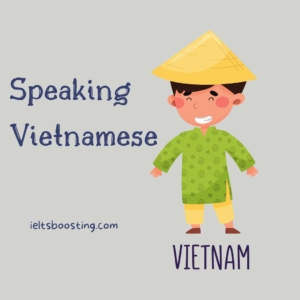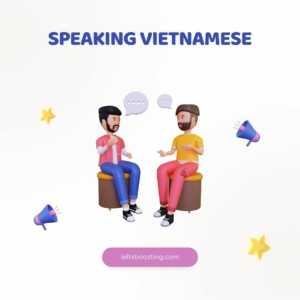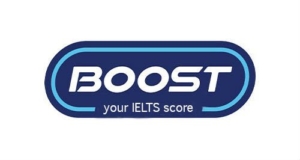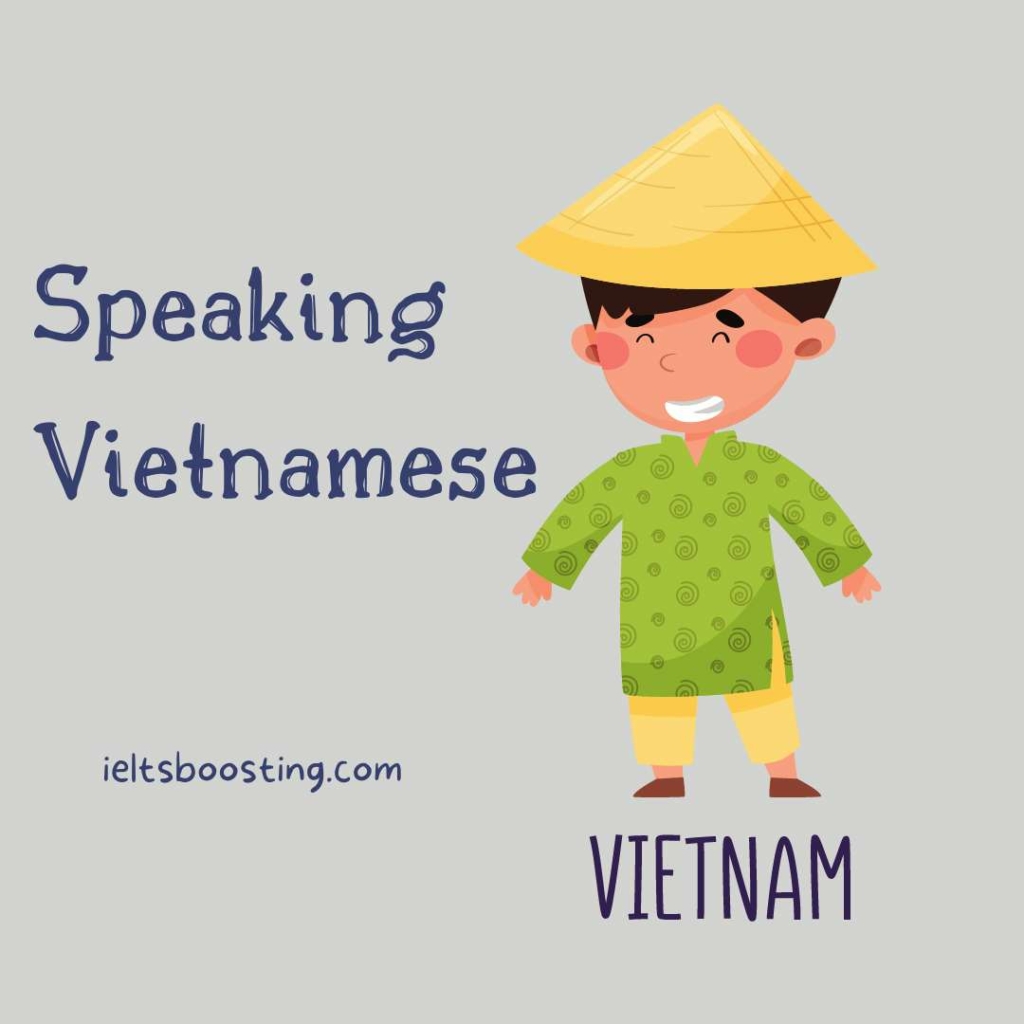Describe a foreigner who speaks Vietnamese very well
You should say:
Who this person is
Where he/she is from
How he/she learns Vietnamese
And explain why he/she can speak Vietnamese well

Describe a foreigner who speaks Vietnamese very well
Answer for describe a foreigner who speaks Vietnamese very well
The foreigner I know who speaks Vietnamese well is my friend, Yuki, who hails from Japan. Yuki’s proficiency in Vietnamese is quite impressive, and his journey to mastering the language is both intriguing and inspiring.
Yuki’s journey into the world of Vietnamese began when he moved to Vietnam for work. He quickly realized the importance of knowing the local language to navigate daily life and establish meaningful connections with people. Determined to learn Vietnamese, Yuki didn’t rely solely on traditional language courses; instead, he sought out practical opportunities for language exchange.
One of the key reasons why Yuki can speak Vietnamese so well is his dedication. This played a significant role in his language acquisition. He dedicated time each day to practice Vietnamese through conversations with locals, reading books, or watching Vietnamese TV shows. His commitment to learning the language was unwavering, and he was not discouraged by initial challenges.
Furthermore, Yuki’s outgoing and sociable personality made it easier for him to engage with native speakers. He actively sought opportunities to engage in conversations and was not afraid to make mistakes. This fearlessness helped him rapidly improve his fluency.
Vocabulary for describe a foreigner who speaks Vietnamese very well
- Proficiency – the ability to do something very well – sự thành thạo.
- Intriguing – very interesting because of being unusual or not having an obvious answer – hấp dẫn.
- Inspiring – making you feel enthusiastic or excited about something – truyền cảm hứng.
- Navigate – to find one’s way – điều hướng.
- Meaningful – having a serious, important, or useful quality or purpose – có ý nghĩa.
- Connections – relationships among people and things – các mối quan hệ.
- Determined – having made a firm decision and being resolved not to change it – quyết tâm.
- Opportunities – chances to do something – cơ hội.
- Dedication – the willingness to give a lot of time and energy to something – sự cống hiến.
- Acquisition – the learning or developing of a skill, habit, or quality – sự tiếp thu.
- Commitment – the state or quality of being dedicated to a cause or activity – cam kết
- Sociable – willing to talk and engage in activities with other people; friendly – hòa đồng.
Part 3-Describe a foreigner who speaks Vietnamese very well
What foreign languages do Vietnamese children learn?
Vietnamese children are exposed to a variety of foreign languages in their education system. English is the most prevalent, often starting from a young age, and is a mandatory part of their curriculum. Additionally, languages like Russian, Japanese, French, and Chinese are taught in schools. The Ministry of Education is also expanding their programs to include Korean and German, demonstrating a commitment to providing a broad linguistic foundation for students. These languages open up numerous avenues for Vietnamese children in terms of global communication, cultural understanding, and future career
- Exposed – tiếp xúc: to come into contact with something or experience it.
- Prevalent – phổ biến: widespread in a particular area or at a particular time.
- Mandatory – bắt buộc: required by law or rules; compulsory.
- Curriculum – chương trình giáo dục: the subjects comprising a course of study in a school or college.
- Commitment – cam kết: the state or quality of being dedicated to a cause or activity.
- Linguistic – ngôn ngữ: relating to language or linguistics.
- Foundation – nền tảng: an underlying basis or principle.
- Avenues – con đường: a way of approaching a problem or making progress toward something.
Why do Vietnamese children learn English?
Vietnamese children learn English for several compelling reasons. Firstly, English is considered a global lingua franca, opening doors to international communication and business opportunities. Secondly, it enhances access to global information, academic resources, and literature. Additionally, English proficiency increases competitiveness in a global job market. Lastly, the Vietnamese government promotes English education to foster economic growth and strengthen diplomatic relations. Overall, learning English is seen as a crucial skill for personal and professional development in an increasingly interconnected world.
- Compelling – thuyết phục: evoking interest, attention, or admiration in a powerfully irresistible way.
- Lingua franca – ngôn ngữ phổ thông: a language used for communication between speakers of different native languages.
- Global – toàn cầu: relating to the whole world or international scope.
- Academic resources – tài liệu học thuật: materials and references used for educational purposes.
- Proficiency – sự thành thạo: the ability to do something very well.
- Competitiveness – tính cạnh tranh: the ability to compete effectively in a challenging environment.
- Diplomatic relations – quan hệ ngoại giao: official interactions and connections between countries.
- Interconnected – kết nối: linked or connected with one another.
Why are so many people learning English?
The widespread adoption of English as a global language has led to the increasing number of people learning it for various reasons. Firstly, English serves as a universal means of communication in international business, trade, and diplomacy, facilitating global interactions. Secondly, it provides access to a vast reservoir of information, as much of the world’s academic and digital content is available in English. Additionally, proficiency in English enhances employability and career prospects, as many multinational companies require it. Lastly, learning English is a gateway to cultural exchange and understanding, fostering connections between people from diverse backgrounds.
- Widespread – phổ biến: existing or happening over a large area or among many people.
- Universal – phổ cập: applicable or common to all cases.
- Diplomacy – ngoại giao: the profession, activity, or skill of managing international relations.
- Facilitating – tạo điều kiện: making an action or process easier.
- Reservoir – nguồn tài liệu: a large supply or source of something.
- Proficiency – sự thành thạo: the ability to do something very well.
- Employability – khả năng tìm việc: the quality of being suitable for paid work.
- Gateway – cửa ngõ: a means of access or entry to something.
- Cultural exchange – trao đổi văn hóa: the sharing of cultural ideas, customs, and experiences among different societies.
- Diverse – đa dạng: showing a great deal of variety or difference.

Describe a foreigner who speaks Vietnamese very well
How can you help children learn English?
To facilitate children’s English learning, it’s essential to provide a supportive environment. Firstly, enrolling them in language courses or schools with qualified instructors can offer structured learning. Secondly, exposure to English media, such as cartoons, books, and songs, can make learning enjoyable. Thirdly, encouraging regular practice through conversations or language games with family and peers is crucial. Lastly, fostering a positive attitude towards language acquisition and celebrating their progress can boost motivation. Overall, a combination of formal education, immersive experiences, and a nurturing atmosphere helps children learn English effectively.
- Facilitate – tạo điều kiện: to make a process or action easier.
- Structured – có cấu trúc: organized and planned in a systematic way.
- Exposure – sự tiếp xúc: being subjected to something or someone, especially regularly.
- Immersive – sâu đắm, tham gia hoàn toàn: involving deeply or completely in an activity or environment.
- Motivation – động viên, động lực: the reason or reasons one has for acting or behaving in a particular way.
- Nurturing – nuôi dưỡng: caring for and encouraging the growth or development of something.
- Language acquisition – sự tiếp thu ngôn ngữ: the process of learning and becoming proficient in a language.
Do you think the way people learn English today is the same as in the past?
The way people learn English has evolved significantly over time. In the past, traditional classroom settings and textbooks were the primary methods. However, today, technology has transformed language learning, with the widespread use of interactive apps, online courses, and language exchange platforms. The accessibility of authentic English content through the internet has also enriched the learning experience. Moreover, the focus has shifted towards practical communication skills rather than rote memorization, making the learning process more engaging and relevant to real-life situations. Overall, modern English learning methods are more dynamic and adaptable to individual needs.
- Evolved – phát triển: developed or changed over time.
- Traditional – truyền thống: relating to long-established customs or ways of doing things.
- Interactive – tương tác: involving active communication or participation.
- Enriched – làm giàu thêm: made more abundant or valuable.
- Rote memorization – học thuộc lòng: the process of learning something through repetition without necessarily understanding its meaning.
- Engaging – hấp dẫn: attracting and holding the attention of learners.
- Relevant – có liên quan: closely connected or appropriate to the matter at hand.
- Adaptable – linh hoạt: capable of adjusting to different conditions or circumstances.
What are the benefits of the Internet for people’s learning?
The internet offers numerous benefits for people’s learning. Firstly, it provides unparalleled access to a vast amount of information and educational resources, allowing individuals to explore a wide range of subjects at their own pace. Secondly, online courses and tutorials offer flexibility, enabling learners to study when and where it’s convenient for them. Additionally, the internet fosters collaboration and communication through forums, discussion groups, and video conferencing, allowing learners to interact with experts and peers globally. Lastly, it promotes self-directed learning, empowering individuals to take control of their education and pursue their interests actively
- Unparalleled – không có gì sánh bằng: having no equal or match.
- Educational resources – tài liệu học tập: materials and references used for learning.
- Flexibility – tính linh hoạt: the ability to adapt to different situations and schedules.
- Collaboration – sự hợp tác: working together with others to achieve a common goal.
- Interaction – tương tác: communication or engagement with others.
- Self-directed learning – học tự quản: the process in which individuals take the initiative and responsibility for their own learning.
- Democratized – được phổ biến hóa: made accessible and available to a broader range of people.


